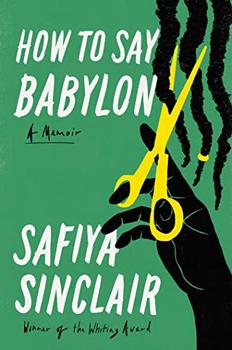
A Memoir
by Safiya Sinclair
With echoes of Educated and Born a Crime, How to Say Babylon is the stunning story of the author's struggle to break free of her rigid Rastafarian upbringing, ruled by her father's strict patriarchal views and repressive control of her childhood, to find her own voice as a woman and poet.
Throughout her childhood, Safiya Sinclair's father, a volatile reggae musician and militant adherent to a strict sect of Rastafari, became obsessed with her purity, in particular, with the threat of what Rastas call Babylon, the immoral and corrupting influences of the Western world outside their home. He worried that womanhood would make Safiya and her sisters morally weak and impure, and believed a woman's highest virtue was her obedience.
In an effort to keep Babylon outside the gate, he forbade almost everything. In place of pants, the women in her family were made to wear long skirts and dresses to cover their arms and legs, head wraps to cover their hair, no make-up, no jewelry, no opinions, no friends. Safiya's mother, while loyal to her father, nonetheless gave Safiya and her siblings the gift of books, including poetry, to which Safiya latched on for dear life. And as Safiya watched her mother struggle voicelessly for years under housework and the rigidity of her father's beliefs, she increasingly used her education as a sharp tool with which to find her voice and break free. Inevitably, with her rebellion comes clashes with her father, whose rage and paranoia explodes in increasing violence. As Safiya's voice grows, lyrically and poetically, a collision course is set between them.
How to Say Babylon is Sinclair's reckoning with the culture that initially nourished but ultimately sought to silence her; it is her reckoning with patriarchy and tradition, and the legacy of colonialism in Jamaica. Rich in lyricism and language only a poet could evoke, How to Say Babylon is both a universal story of a woman finding her own power and a unique glimpse into a rarefied world we may know how to name, Rastafari, but one we know little about.
"Sinclair recounts her harrowing upbringing in Jamaica in this bruising memoir…. In dazzling prose … she examines the traumas of her childhood against the backdrop of her new life as a poet in Babylon…. Readers will be drawn to Sinclair's strength and swept away by her tale of triumph over oppression. This is a tour de force." —Publishers Weekly (starred review)
"Sinclair's gorgeous prose is rife with glimmering details, and the narrative's ending lands as both inevitable and surprising. More than catharsis; this is memoir as liberation." —Kirkus Reviews (starred review)
"Dazzling. Potent. Vital. A light shining on the path of self-deliverance." —Tara Westover, author of Educated
"An essential memoir. Sinclair's devotion to language has been lifelong, and How to Say Babylon is the result. This book is lit from the inside by Sinclair's determination to learn and live freely, and to see her beloveds freed, too." —Jesmyn Ward, author of Let Us Descend
"With strikingly stunning prose, How to Say Babylon crackles with both urgency and intimacy. Sinclair is a gifted and poetic voice whose lyrical story of personal reclaiming will inspire generations." —Tembi Locke, author of From Scratch
"How to Say Babylon is a narrative marvel, the testimony of an artist who literally writes her way out of a life of repression, isolation and abuse into one of art, freedom, love and wonder. To read it is to believe that words can save, words can heal, and words can imbue us with near divine power." —Marlon James, author of A Brief History of Seven Killings, winner of the Man BookerPrize and Black Leopard, Red Wolf
This information about How to Say Babylon was first featured
in "The BookBrowse Review" - BookBrowse's membership magazine, and in our weekly "Publishing This Week" newsletter. Publication information is for the USA, and (unless stated otherwise) represents the first print edition. The reviews are necessarily limited to those that were available to us ahead of publication. If you are the publisher or author and feel that they do not properly reflect the range of media opinion now available, send us a message with the mainstream reviews that you would like to see added.
Any "Author Information" displayed below reflects the author's biography at the time this particular book was published.
Safiya Sinclair was born and raised in Montego Bay, Jamaica. She is the author of the poetry collection Cannibal, winner of a Whiting Writers' Award, the American Academy of Arts and Letters' Metcalf Award in Literature, the OCM Bocas Prize for Caribbean Poetry, and the Prairie Schooner Book Prize in Poetry. Cannibal was selected as one of the American Library Association's Notable Books of the Year, was a finalist for the PEN Center USA Literary Award and the Seamus Heaney First Book Award in the UK, and was longlisted for the PEN Open Book Award and the Dylan Thomas Prize.
Your guide toexceptional books
BookBrowse seeks out and recommends the best in contemporary fiction and nonfiction—books that not only engage and entertain but also deepen our understanding of ourselves and the world around us.